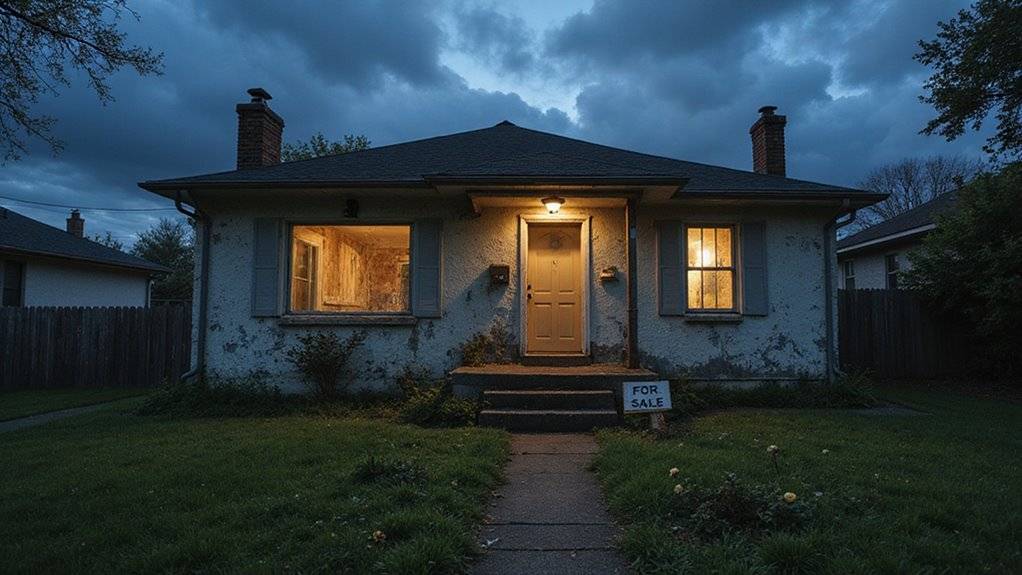Facing foreclosure and unable to sell your home is a serious problem. This situation can feel overwhelming and hopeless. Many homeowners struggle with this stressful reality every day. The consequences of not selling before foreclosure are harsh.
Your lender may take legal action to seize your property. This can lead to a public auction and major financial loss. But there’s hope if you act quickly and seek help.
You can explore options like loan modification or short sales to avoid foreclosure. Guidance from experts can make a big difference. This blog will guide you through solutions to tackle foreclosure challenges.
Key Takeaways
- If you can’t sell before foreclosure, the lender may initiate legal action to repossess the property.
- The property could be sold at a public auction, often at a loss to you.
- You may face eviction if the auction succeeds, with a notice to leave within days.
- Foreclosure severely impacts your credit score, dropping it by 100-160 points for seven years.
- You might face a deficiency judgment if the sale doesn’t cover the loan balance.
What Is Foreclosure?

Foreclosure is a legal process where a lender takes your property if you miss mortgage payments. It happens when you can’t meet your loan duties, allowing the lender to recover their money. This serious action has roots in history and follows property law rules.
Lenders start foreclosure to protect their investment if payments stop. The process varies across countries, with some being fast and others slow. If you face this, you must act quickly to avoid losing your home.
Understanding foreclosure is crucial as it impacts your financial future. If ignored, it could damage your credit severely. Take steps early to seek help or negotiate with your lender. Facing this situation, you can explore options like a fast cash offer to sell your home quickly and avoid foreclosure.
Why Homeowners Try to Sell Before Foreclosure
As a homeowner facing foreclosure, you might push to sell your property quickly to protect your credit score from the severe damage a foreclosure can cause. You’re also likely aiming to sidestep the complex legal issues that arise during the foreclosure process, saving yourself time and money. Beyond finances, selling beforehand can offer you significant emotional and psychological relief, helping you move forward without the stress of losing your home. If you’re in Missouri, local home buyers can provide a fair cash offer to help you avoid foreclosure swiftly.
Preserving Credit Score
Facing the risk of losing your home is tough, but selling before foreclosure can save your credit score. If foreclosure happens, it could drop your score by up to 160 points. This protects your future chances of getting loans or housing.
To keep your score safe, start by reviewing your credit reports carefully. Dispute any errors you find right away. If mistakes stay, they might harm your score unnecessarily.
Next, talk to your lenders about your situation. Ask if they can be lenient on reporting late payments. This could help reduce the impact on your score.
Finally, act quickly to sell your home and settle debts. If you delay, foreclosure might start and damage your score. Taking fast action is key to minimizing loss.
Avoiding Legal Complications
Selling your home before foreclosure can prevent serious legal troubles. It helps you avoid lawsuits, liens, and lender disputes. If you act early, you can save time and money.
Legal proceedings are often complex and draining. By using Preventive Law ideas, you can dodge these issues. If problems arise, you’ll be better prepared.
Mediation can help you negotiate with lenders peacefully. It avoids court battles and protects your legal status. If you wait, foreclosure notices might create bigger problems.
Take control now to escape costly legal messes. Don’t let foreclosure complications overwhelm you. If you act fast, you can stay safe.
Emotional and Psychological Relief
Stress from foreclosure threats can burden you deeply. Selling your home might save both your finances and mental health. If you act, the emotional pain of losing a home lessens with relief.
To handle this stress, try simple coping steps. Mindfulness, like meditation or deep breathing, can calm your mind. If anxiety persists, this practice helps you stay grounded.
Support groups offer a safe space to share struggles. Connecting with others in similar situations brings comfort. If you join, you’ll find encouragement and understanding.
Professional help can guide you through tough emotions. A counselor provides tools to manage overwhelming feelings. If emotions grow heavy, seeking help is wise.
Challenges in Selling a House Before Foreclosure
When you’re racing against foreclosure, time constraints can severely limit your ability to sell your house quickly. Market conditions might also work against you, as a slow or oversaturated market can stall your efforts to attract buyers. On top of that, if your property’s condition or valuation isn’t up to par, you’ll face even tougher hurdles in securing a fair offer. Additionally, selling a home with foundation issues can further complicate the process and reduce potential offers.
Time Constraints
When facing foreclosure, time is short, and selling your house quickly becomes urgent. You must act fast to meet tight lender deadlines. If delays happen, you risk losing your property.
Time pressure can be intense, so smart planning is essential. Daily schedules should focus on key tasks like pricing. If weekends are free, use them for open houses or agent meetings.
To stay on track, prioritize important actions every day. Keep a strict calendar to avoid missing foreclosure deadlines. If you procrastinate, your chances of selling could slip away.
Market Conditions
Market conditions can make foreclosure timelines even harder to manage. Economic shifts often lower home demand, making sales tough. If a downturn hits, finding buyers becomes a real challenge.
Interest rate changes also affect your chances of selling. Rising rates might scare off buyers due to costly mortgages. If rates climb, your pool of potential buyers shrinks fast.
To stand out, price your home wisely and market it well. If conditions worsen, staying informed about trends is key. Local and national economic signals can guide your next steps.
Timing and flexibility are crucial in a tough market. If you adapt quickly, you might avoid foreclosure. Stay proactive to handle these challenges effectively.
Property Condition and Valuation Issues
Your property’s condition directly impacts your chances of selling quickly. If it’s in poor shape, buyers may back off. This can delay sales and risk foreclosure.
Neglected repairs, like a bad roof, can lower buyer interest. Such issues might suggest deeper problems in the home. If ignored, these flaws could lead to fewer offers.
Buyers often judge value by the home’s upkeep. A poorly maintained property can result in low offers. If upkeep is lacking, your home’s appeal drops fast.
Correct pricing is vital to attract potential buyers. If valuation methods are wrong, your home might be overpriced or underpriced. This could stall the selling process.
Act quickly to fix any visible damages. Consult experts to assess your home’s true market value. If you delay, selling before foreclosure becomes harder.
What Actually Happens If You Can’t Sell a House Before Foreclosure
If you can’t sell your house before foreclosure, you’ll face a tough transition into the foreclosure process, where the lender takes control of the property. Expect your home to move to an auction, where it’s sold to the highest bidder, often at a significant loss to you. After that, you’re likely to deal with eviction and potential legal ramifications if you don’t vacate the property in time.
Transition Into Foreclosure
Facing foreclosure means you couldn’t sell your house in time. This process is tough and affects more than finances. It can feel personal and overwhelming as you risk losing your home.
You might notice friends pulling away, unsure how to support you. This social isolation can hurt deeply. If it happens, seek out trusted people to talk to.
Your sense of self may change without homeownership. This identity shift can lower your confidence. Acknowledge these feelings and find ways to cope.
To prepare, first understand the foreclosure timeline. Know when your lender might start legal steps. This helps you plan ahead.
Next, talk to your lender about possible options. They might offer delays or solutions if you ask early. Communication is key to finding help.
Finally, address the emotional stress of this loss. Accept that it’s okay to feel upset. Seek support from family or counselors if needed.
Stay active in managing this situation. Taking steps now can make a difference. Proactivity is your strongest tool right now.
Auction Process
The auction process begins when a lender can’t recover losses through a home sale. They schedule a public auction to sell the foreclosed property. This happens at a courthouse or online with bidders competing.
Homeowners lose control over the sale price or who buys the property. The highest bidder usually wins and takes ownership quickly. If you’re a homeowner, expect no delays or second chances.
For potential buyers, preparation is key to succeed in auctions. Set a strict budget before bidding to avoid overspending. If you research the property’s value, you’ll bid wisely.
Auctions move fast and offer no room for hesitation. If you’re bidding, stick to your limit firmly. Understanding the process helps manage expectations effectively.
Eviction and Legal Ramifications
Foreclosure often ends with eviction if the auction fails to help. If the lender or new buyer takes over, they may start legal steps to remove you. Knowing your rights can offer some protection during this tough time.
First, you’ll get an eviction notice demanding you leave within days or weeks. If you stay, the owner might file a lawsuit to force you out. Courts often support these actions based on legal rules.
Yes, you can challenge eviction with valid reasons like mistakes in the process. If errors exist, you might delay or stop the eviction. Always seek legal advice to understand your options.
How Foreclosure Impacts You Financially
When foreclosure hits, you’ll face severe damage to your credit score, making financial recovery a steep climb. You’ll also struggle to secure future loans, as lenders view you as a high-risk borrower after such an event. Beyond that, you’re at risk of tax implications and deficiency judgments, which can further strain your finances. Additionally, if your home sells for less than the mortgage balance during foreclosure, you may face capital gains tax implications on the forgiven debt.
Damage to Your Credit Score
Foreclosure harms your finances by severely damaging your credit score. It can lower your score by 100 to 160 points. This negative mark stays on your credit report for seven years.
If you face foreclosure, finding a job could become harder. Some employers check credit and might see you as unreliable. This could cost you potential opportunities.
Renting a home may also be challenging after foreclosure. Landlords often look at credit scores before approving tenants. A low score might make securing a rental difficult.
Your costs could rise due to a damaged score. Insurance premiums and deposits might increase significantly. If your score drops, expect higher financial burdens.
Difficulty Obtaining Future Loans
A foreclosure seriously harms your ability to get future loans. Lenders see you as a risky borrower after this event. If you apply, they may reject you for mortgages or other credit.
This rejection can last for several years. Lenders will closely check your background if you try again. They might demand proof of a steady job through Employment Verification.
Your Income Stability will also be reviewed carefully. Lenders want to know if you can repay consistently. If your earnings are unstable, approval becomes harder.
Rebuilding trust with lenders takes a lot of time. You must show financial responsibility by saving regularly. Timely bill payments can help improve your chances.
If you stay disciplined, approvals may come eventually. Until then, getting loans remains a tough challenge. Patience and effort are key to overcoming this hurdle.
Tax Implications and Deficiency Judgments
Foreclosure hurts your finances beyond losing your home. It brings tax issues and possible deficiency judgments. If lenders forgive debt, the IRS might tax it as income.
Without exemptions like the Mortgage Forgiveness Debt Relief Act, you could owe a big tax bill. This forgiven debt counts as earnings. Be prepared for this extra cost.
A deficiency judgment happens if your home sale doesn’t cover the loan. Lenders may chase you for the remaining amount. If this occurs, expect legal demands for payment.
You can fight unfair deficiency rulings through appeals. Legal options exist to challenge these judgments. If needed, seek help to protect your rights.
Foreclosure Prevention Tips for the Future
As you look to safeguard your financial future, start by mastering financial planning and budgeting to keep your expenses in check. Build an emergency fund now—it’s a critical buffer against unexpected hardships that could lead to foreclosure. Don’t wait to communicate with your lenders; reach out early if you’re struggling, as they can often provide solutions to help you stay on track. If you’re facing immediate financial distress, consider a fair cash offer from a trusted local buyer to avoid foreclosure.
Financial Planning and Budgeting
Taking charge of your financial future can prevent risks like foreclosure. You have the ability to create stability with planning. If you assess income and expenses, a clear path emerges.
Budgeting tools are essential for managing money wisely. Use templates to track every dollar spent. If overspending happens, you can adjust quickly.
Diversifying investments helps reduce financial risks. Spread assets across different sectors for safety. If one sector struggles, others may protect you.
Cutting unnecessary costs frees up money for important goals. Trim non-essential spending to save more. If debt looms, this step can help repay it.
Emergency Fund Importance
An emergency fund is a vital safety net for unexpected financial troubles. It helps you avoid serious issues like foreclosure. If a crisis hits, this fund can save you from stress.
This fund should cover three to six months of your expenses. Start small if needed, but keep adding money regularly. Consistency ensures you build a strong buffer over time.
Without an emergency fund, sudden costs can hurt your budget badly. Medical bills or car repairs might become overwhelming. If you lack this reserve, missed payments could risk your home.
To create this fund, cut extra spending and save that money. Redirect those savings into your emergency reserve each month. If you prepare now, you’ll protect your financial stability.
Don’t wait for a problem to strike before acting. Building this fund is essential for peace of mind. If you delay, a crisis could catch you off guard.
Communicating With Lenders Early
Building an emergency fund helps, but early contact with your lender can prevent foreclosure during financial trouble. If you foresee payment issues, reach out to them quickly. This shows responsibility and may lead to helpful solutions.
Start by calling your lender and explaining your situation clearly. Be honest about your challenges to build trust. If needed, they might offer support or guidance.
Next, ask about possible options like loan modifications or repayment plans. Lenders often have programs to assist during tough times. If you act early, you increase your chances of finding a fix.
Finally, document every conversation with your lender for reference. Keep notes of dates, names, and agreements made. This ensures clarity if issues arise later.
Conclusion
If you’re facing foreclosure, remember that it’s not the end of your story. You can recover with the right steps. Take time to seek advice and plan ahead.
Should you need to sell quickly, we buy houses for cash to help. This option can prevent further financial stress. Consider it as a way to move forward.
When you’re ready to rebuild, we at Freedom Path Investors are here to assist. Contact us today for support. Let’s work together on your next steps.







